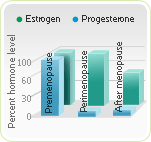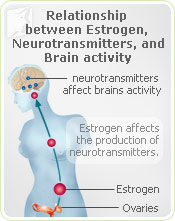All of the 34 menopause symptoms have one common underlying cause: hormonal imbalance. This is the first and primary cause of virtually all menopause symptoms.
These primary hormonal changes in the body also produce a cascade of secondary reactions. For example, changes in estrogen levels affect the central nervous system, which can directly trigger menopause symptoms such as hot flashes, irregular heartbeat, and migraines. Below, both the primary hormonal causes and these secondary causes of menopause symptoms are described in detail.
Please read on to understand the causes of menopause symptoms.
What Happens First: Primary Ovarian Hormone Changes
The physiological changes responsible for menopause symptoms actually begin long before menopause, or the actual cessation of menses. Two major processes fuel the menopausal transition: the loss of ovarian follicles and a resulting decrease in estrogen levels.
Loss of Ovarian Follicles:
From menarche (a woman's first period) on, the number of primary ovarian follicles (eggs) decreases, with especially marked reductions after age 40. The period of waning ovarian function is known medically as the climacteric. Usually, this span of time lasts for several years before the atresia of all estrogen-producing follicles.
Resulting Estrogen Changes:
Moreover, ovarian estrogen production during perimenopause is erratic, such that estradiol levels are unpredictable and can fluctuate between normal, high, and low. While estrogen levels eventual settle at a permanently lower level, estrogen during the menopausal transition can reach levels even higher than premenopause, which can be responsible for some menopause symptoms such as irregular periods.
Other Hormonal Changes:
During the reproductive years, the primary estrogen, 17 beta-estradiol, is produced in the ovaries. Other sites, called extragonadal, produce lower amounts of estrogen. After menopause, these extragonadal sites (e.g. muscle and adipose tissue) become the body's primary source of estrogen.
Levels of testosterone and progesterone are also in a state of flux during perimenopause. These hormonal fluctuations can be responsible for producing certain menopause symptoms. For example, loss of libido and hair loss appear to be two menopause symptoms prompted by changes in androgen (i.e. testosterone) levels.
These are the primary hormonal causes of menopause symptoms. They, in turn, set off a series of other physiological changes which produce specific menopause symptoms. Read on to learn about these secondary causes of the symptoms of menopause.
What Happens Second: Effects on the Rest of the Body
All of the aforementioned hormonal changes during menopause lead to a host of menopause symptoms affecting different bodily systems. To understand these secondary hormonal effects, please read on about the cardiovascular, vasomotor, genitourinary, nervous and other systems.
Cardiovascular Menopause Symptoms and their causes:
Menopause-related hormonal changes affect the heart and vascular system. These effects can cause menopause symptoms such as migraines, dizziness, and irregular heartbeat.
Estrogen and the Cardiovascular System
- Estrogen has a proven effect on the:
- Metabolism and disposition of cholesterol.
- Plasma levels of high and low density lipoproteins (H/LDL).
- Smooth muscle cell proliferation in arterial wall.
- Stimulates widening and inhibits constriction of coronary arteries.
- Modulates autonomic nervous system, which works to regulate heartbeat.
When hormone levels change during menopause, vascular function is typically affected. This can prompt abnormalities in heart rate and the constriction of blood vessels, which can trigger headaches, migraines, and dizziness.
The reduction in ovarian function also appears to be correlated with heart disease risk in menopausal women. Studies show that after menopause, the risk of heart disease increases because of reduced levels of estrogen in the body.
Vasomotor Menopause Symptoms and their Causes:
Vasomotor menopause symptoms include hot flashes and night sweats. These are some of the most common and well known of all the 34 menopause symptoms. The cause of vasomotor menopause symptoms involves the brain's hypothalamus and its regulation of body temperature. The withdrawal of estrogen during menopause often tricks the hypothalamus into thinking the body is overheating. This sets off a chain reaction during which the body attempts to “cool down” by sweating, increasing the heart rate, “flushing” the skin, and more.
Genitourinary Menopause Symptoms and their Causes:

Irregular periods, vaginal dryness, incontinence, and loss of libido related to physiological changes are considered genitourinary menopause symptoms. Lower levels of estrogen are associated with genital atrophic changes, which can cause vaginal dryness and incontinence. These changes in genital functioning can consequently decrease a woman's interest and pleasure in sex, leading to loss of libido. Irregular periods are a virtually universal genitourinary symptom of menopause associated with fluctuating levels of estrogen in the body.
Central and Peripheral Nervous System Symptoms and their Causes:

Irregular periods, vaginal dryness, incontinence, and loss of libido related to physiological changes are considered genitourinary menopause symptoms. Lower levels of estrogen are associated with genital atrophic changes, which can cause vaginal dryness and incontinence. These changes in genital functioning can consequently decrease a woman's interest and pleasure in sex, leading to loss of libido. Irregular periods are a virtually universal genitourinary symptom of menopause associated with fluctuating levels of estrogen in the body.
Nervous system changes causes by estrogen fluctuations in menopause can also affect cognition and energy levels, leading to difficulty with memory, concentration, and alertness.
Psychological Menopause Symptoms and Their Causes:
The estrogen changes that occur with menopause also have a complex, yet proven, effect on the brain's regulation of mood and emotion. Erratic estrogen levels can trigger correspondingly erratic levels of serotonin and norephinepherine (both mood-regulating neurotransmitters) in the brain. Estrogen can also affect levels of cortisol, the chemical closely correlated with stress. These neurochemical changes can result in psychological menopause symptoms including loss of libido, anxiety, panic disorder, depression, mood swings, and irritability.
Other Systemic Causes of Menopause Symptoms
Skin changes: Menopause symptoms, such as itchy skin, can be associated with declining levels in collagen production in the skin around the time of menopause.menopause symptoms changes
.png)
Bone changes: Estrogen changes in menopause can also cause bone-related menopause symptoms, such as osteoporosis and dental problems. Scientists have discovered a veritable link between ovarian follicle reduction and accelerated bone calcium loss.
Gastrointestinal changes: Primary hormonal changes in menopause can also affect the gastrointestinal system, potentially causing digestive problems, bloating, and weight gain.
Immune System changes: Allergies may develop around the time of menopause due to changes in the immune system related to hormonal change.
Other Causes of Menopause Symptoms
Other factors can also affect a woman's experience of menopause symptoms. For example, many women who go through surgical or medical menopause experience more extreme menopause symptoms because changes in hormone levels are so immediate and abrupt.
Stress, major life changes, aging, diet, and level of activity can contribute to menopause symptoms. Though uncommon, certain disease symptoms sometimes mimic menopause symptoms. While disease causes are rare, it is wise to seek the expertise of a qualified doctor when concerned about the causes of menopause symptoms.
